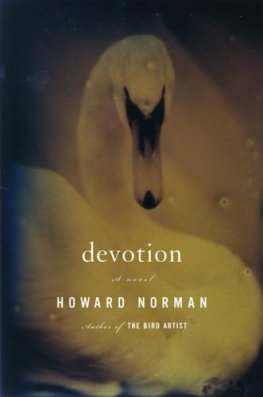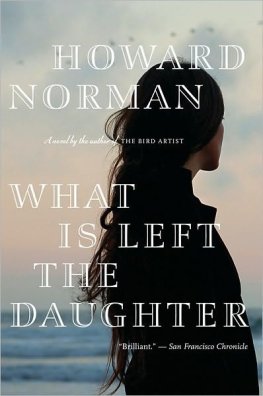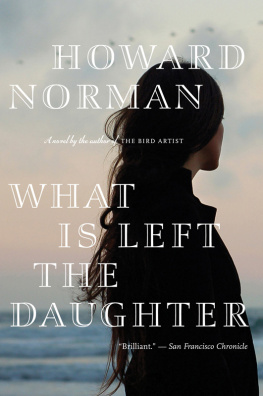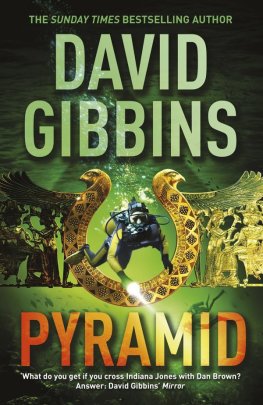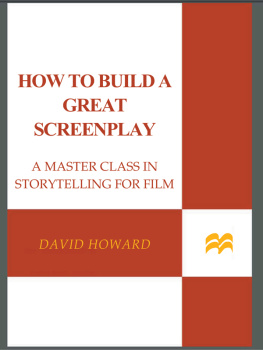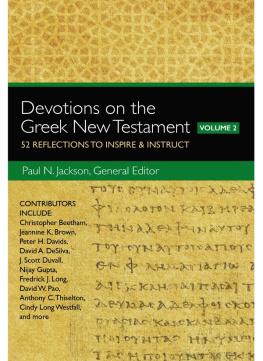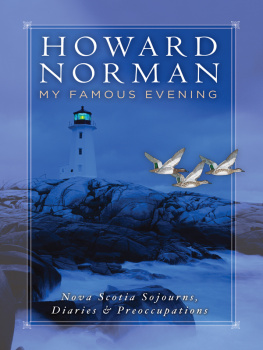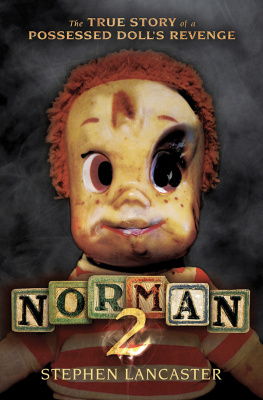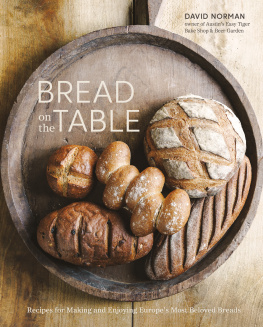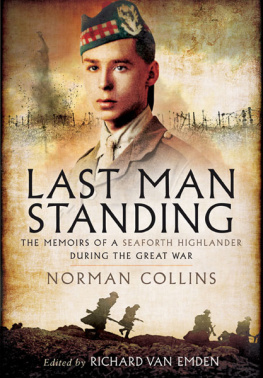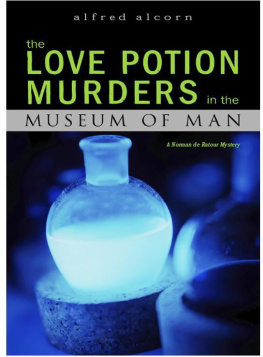I thank Melanie Jackson and Jane Rosenman for their close reading and encouragement.
H.N.
Devotion is a thing that demands motives.
ANATOLE FRANCE
HERE IS what happened. In London on the morning of August 19, 1985, David Kozol and his father-in-law, William Field, had a violent quarrel on George Street. In a caf they came to blows. Two waitresses threw them out. On the sidewalk they started up again. William stumbled backward from the curb and was struck by a taxi. The London police record called it assault by mutual affray.
This took place eleven months ago. In the intervening time David replaced William as caretaker of the Tecosky estate, near Parrsboro, Nova Scotia, on the north shore of the Bay of Fundy. William had been recovering in the main house.
Now it is near dusk on July 13, 1986. David, dressed in khaki shorts and a black T-shirt, barefoot, followed a line of nineteen swans with clipped wings up from the spring-fed pond. He wondered if there was such a word as swanherd. He enjoyed watching each swans awkward, comical swagger. The summer had been one relentless heat wave. David said out loud, A swan walked right up and bit me in a park when I was eleven, in Vancouver. Maybe one of your distant cousins. Who knows? Once David got the swans inside their pen and double-latched the gate, he walked across the lawn, wet from a fleeting late-afternoon cloudburst, the first rain in a month. Leaving footprints on the kitchens checkerboard linoleum floor, he walked to the counter and reheated coffee. He sat at the kitchen table and continued reading The Crime of Sylvestre Bonnard by Anatole France, the book Williams daughter, Maggie, was reading when David had seen her for the first time.
Before he met Maggie, David had fallen off reading novels. Yet he purchased nine novels by Anatole France, each a small leather-bound copy, on a single visit to the Antiquarian Muse, a used-book shop in Truro, a forty-five-minute drive east from the estate on Route 2. In June he read The Queen Pedauque and Penguin Island, often staying up through the night. Actually, he did not have the concentration or critical wherewithal to measure his level of engagement with a given novel; he only knew they kept him connected to Maggie, who, as William said, is still your wife on paper. His reading tastes generally did not run to such philosophically leavened plots, or such noble sentiments as the forces of my soul in revolt. Yet he had written those very words out on a piece of paper, admitting they corresponded to how he felt since the accident.
The guesthouse consisted of a kitchen, a small sitting room, a bedroom, and a utility room. It had a sloped roof with black shingles. On the fireplace mantel in the sitting room was a 1950s Grundig-Majestic turntable. David stacked records on the floor. He had come to rely on Bachs suites for unaccompanied cello, performed by the Hungarian Janos Starker. This was a utilitarian choice. David knew he was in a bad state, that every day he had to consciously work himself up to melancholy. Somehow the Bach compositions assisted in this. They allowed, as Anatole France had written of an acquaintance, splendid companionship: my self-inflicted torment, his stark spirit. David drank too much coffee while reading. Worked his heartbeat to Morse code. What might the message be, besides not to drink so much coffee? He could not read it, an illiterate at reading his own heart.
He set down The Crime of Sylvestre Bonnard in order to write in his notebook. It was 3 A.M. He had come to think of it as an if only notebook. If only Maggie and I had flown back together from our honeymoon to Halifax; if only, when I saw Katrine Novak in front of Durrants Hotel in London, I had ordered my taxi to continue on past; if only I hadnt allowed Katrine Novak up to my hotel room, William would not have found me out; if only I hadnt chased William, down George Street, he would not have been almost killed by a taxi
The strange thing about this notebook was that David believed everything he wrote at the moment he wrote it. Later the truth always sank in. Although he was mollified for half an hour or more by filling pages with these solipsistic equations of remorse, he finally knew that no ordering or reordering of events could save him from the effects of his own folly. Small things led to big damages or something like that. He had badly screwed up; the steep price exacted was the ceaseless reminder of Maggies absence. It flummoxed and pained him that his wife was not locatable, a situation he had, of course, brought on himself. He literally did not know, day to day, month to month, where she was in the world. Most likely Halifax, where she kept an apartment, but possibly somewhere in Europe, where her work occasionally took her. She was publicity director of the Dalhousie Ensemble, a faculty-student classical-music group consisting of twelve players, from Dalhousie University. His father-in-law William always knew Maggies whereabouts, but was not telling.
He marked his place in the novels with a leather bookmark borrowed from the library in the main house. He kept The Crime of Sylvestre Bonnard on the kitchen table. The others were in a pile on the counter next to the bread boards. My Friends Book, The Red Lily, A Mummers Tale, The Gods Are Athirst, Manuscript of a Village Doctor, Patroologica. He was grateful that Anatole France had written so many. He read by a floor lamp set next to the table. On the most sweltering of nights, if he managed to sleep at all, he did so in a chaise longue on the screen porch off the sitting room. He set up electric table fans for a cross-breeze. Often there was a mist so dense he could not see his own feet or hands when, guided by the swans muttering, he walked to the pen and fed them dry kernels of corn. Their bills jabbed the palm of his hand, but they only meant to take what was unexpectedly offered, a kind of midnight snack.
LOCALLY, it was known as the Tecosky estate. It consisted of 248 acres. There were few private estates of comparable size in Nova Scotia, but there was a larger one near Mabou, along the Northumberland Strait on Cape Breton. The owners of the Tecosky estate were Mr. Isador and Mrs. Stefania Tecosky, Polish Jews who had miraculously navigated the terrors of their century (Well, it was a miracle, wasnt it? Stefania had said. What else could it be called, good fortune? Fortunes are for fortunetellers: liars. History is survived thats all there is to it.) and forged a route no more or less unlikely than that of any other immigrant Jew who had entered Canada, as they had after World War II. Stefania had said, One meaning of the word diaspora is happy to be anywhere alive at all.
In 1986 both Isador and Stefania were seventy-seven years of age. Their permanent residence was on Islay pronounced Eye-lain the Scottish Hebrides. Many people who lived in Parrsboro and the neighboring villages of Upper Economy, Economy, Lower Economy, and Great Village referred to the Tecoskys as very educated people. Dory Elliot, who owned Minas Bakery in Parrsboro, had said to David, I miss them. They had those accents, Stefania and Izzy. It made English something different, eh? And theyd been through things in Europe gives a person nightmares even to hear about them. Nice people. Good people. Not church people of the local denomination. They knew good books and paintings and history. The elementary school in Great Village had them in as guest speakers any number of times. But they didnt bandy it about. They never overly kept to themselves nor come into town every day, and thats the way it is with lots of people around here, isnt it?

